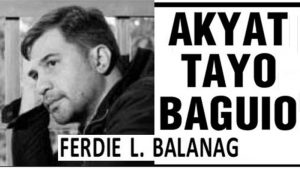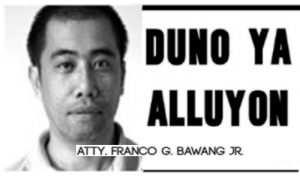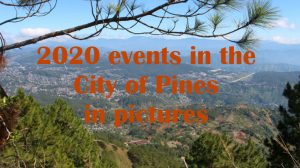Baguio City — From Cordillera Administrative Region’s (CAR) lofty mountains, downwards to the salty waters lapping at the shores of Region 1, a simple piece of cloth has spurred thousands to rally for a cause and march with it, residents reminisced last Saturday.
Stride with that piece of cloth and raise chances of survival. Discard it, and raise the specter of falling by the wayside, residents foretell.
A small rectangular piece of flimsy cloth with garter straps, colored light-blue or black and without embroidery has become “a don’t leave home without it,” item for highlanders, lowlanders and millions of Filipinos as well.
One may well forget a cell phone, wallet or locking the house when going out – but not that piece of cloth. Without it can get one in deep trouble.
For the men interviewed by Herald Express, who say they can stand for long, the sight of dainty women but not the sight of items in their handbags, point out that piece of cloth now in a woman’s handbag is unfortunately causing beauty of a woman’s face to be hidden for appreciation by longing eyes.
Ever-exuberant professor Silvestre Aben, Vice-President, Business Affairs of Benguet State University (BSU), who can peer at things with prospective twinkle-of-an-eye, smiles with the notion that one can forget to kiss goodbye a spouse when leaving home, but for goodness sakes, not to go out with that piece of cloth.
Not since humans invented the underwear has a single item of apparel latched on so widely and quickly from Batanes to Sulu, traversing cultures, borders, sexes and generations with almost the same global-shaking speed as the coronavirus for which the cloth has been devised to confront.
Such a piece of cloth able to alter a dramatic change in global human behavior, yet can’t change people being victims of forgetting – a memory slip all too common part of daily life that strikes all. Bar none.
As it happened to Sandra Apilado, alumna of Easter School and resident of Central Guisad barangay.
“Many times,” Sandra related, on forgetting a piece of cloth simply called face mask. “That I even went to a store to buy, then heading home, people were staring at me then I realized I had no mask so I covered my nose with my shirt and hurried home.”
See other columns:





As like other human habits, use of a new apparel can cause a bit of hesitation with varying degrees of zeal, as Sandra noted, “We wear them (face masks) as protocol or protocause.” Still, and thankfully she never encountered any arguing over its use.
Part of hesitation of face mask use can make one to gently remind somebody, like what happened to Sandra’s Mom in the early stage of face mask implementation when her Mom balked at the idea and Sandra, “just reminding, my Mom who didn’t want to use it the first days.”
For Sandra: “Personally “I, myself don’t like wearing face mask so I prefer to stay at home and breath freely.”
“But if I need to go out, I wear a face mask as protection and to ward off the virus. Going out to town or elsewhere, I always have in my bag a spare face mask in case it falls or the garter snaps, still best to wear face mask anywhere because we don’t know where the virus is coming from and to follow protocols for our sake, our families and to everyone,” Sandra explained.
Asked if face masks sell like pancakes, Sandra, in burst of Ilocano and English, said, “Wen met a. The locals sew better face masks and fashionable pay. Those China made? He-He!”
“Adda met dagidiay dad-duma naka-imprinta ti ngiwat ti politician ken artista. I love it! Di adda income dagidiay ammo na nga ag-dait. Stay healthy, stay wise,” Sandra added.
That all adapted to the discomfort of masking their airways and facial expressions point to an indicator for the belief that a citizenry is fundamentally caring, to sacrifice for a common good – a common cause.
As explained well by Dominga Gravidez, government school teacher presently assigned at Pinget Elementary School, Baguio, when, having forgotten it, said, “I needed to go back home. For that experience, I decided to put extra mask in my bag.”
For common good, Dominga is thankful that in her barangay, Pinget, “So far, they are all pro on face mask.”
Face masks now span generations and indicate now isn’t the time of resistance to it nor distrust to scientific evidence that mask curb contamination.
Dominga said, “I taught the value of using face mask to my 4-year old apo. So it instilled in her mind that wearing mask is a way of protecting her from covid.” And Dominga’s 4-year old apo took to the teaching earnestly with the curiosity that infects children, and asked Dominga, “Lola, apay nu ag-usarak kanayon mask, pumanawen ni covid?”
It’s said human reflex causes people to size up somebody as to apparel or hairdo and comparing these with themselves. Kinds of face mask happen to be sized up as well.
For Dominga, personally, she prefers using N95 respirator. “Best and safe pa rin yung N95,” Dominga stressed. Although seeing inabel (woven) face mask, she curiously smiles, saying, “I saw people wearing (it). As if maymayat.”
See more stories:





Zeroing on seniors and asked what she’d do if an elderly’s in trouble whose face mask strap snapped off the cloth. Dominga advises any elderly, “to use a handkerchief temporarily,” while “she would help the elderly to buy a mask, because it’s really important to wear a mask while going around town.”
Firm on the belief that citizens have to wear face masks for other people now, rather than only for ourselves, Dominga concluded in the interview: “Wearing face mask is important because that’s still the best to get rid of the virus. Also, wearing face mask prevents spread of virus on air to someone.”
Face mask has become, to the thoughts of Sandra and Dominga, a mirror of humanity, now so much more than just a mere face covering in near-ending 2020, humankind cowers in a broken glass of uncertainty.
It follows, too, to best knowledge of Jerell Joy Banaken, nurse assigned at Luis Hora Memorial Regional Hospital, Abatan, Bauko, Mountain Province and also serving as executive secretary of Tribal Submission, Philippines, that face mask has spread wider and faster than any other item in the history of clothing.
Such speed of spread reminded Jerell of a time, “I was about to walk out the door, remembered I wasn’t wearing one, then went back right away to get it. Although I always have extra in my bag.”
Jerell had this lucky chance of one time having witnessed a spark of friendly banter of highland kailyans (province mates) on face mask use.
Jerell retold how one kailyan was heard to say, “Sumali din face mask sisa, es. Nu usaren adi tan makaanges. Nu adi tan matey si covid et matey ta adi tan adi ta makaanges ay usto!” (Face mask gets in the way, confound it! If you use it, you can’t breathe. If we don’t die of covid, then we die because we can’t breathe well).
Another kailyan, Jerell went on, humorously complained, “Pirmi din manfa-face mask. Pumtok din ado ay kamuro.” (Terrible, this face mask use; pimples exploding all over the face). Could be that kailyan suffers from cloth allergy or face mask skin irritation, Jerell wondered.
Jerell, also recalled of a time how one of her colleagues shouted “covid, covid,” to another colleague who forgot to wear a mask, “just to get the person to wear mask during duty.”
A sacrifice Jerell and other front liners have to make for community’s good, as people need to be more mindful on face mask use. But Jerell thinks “it’s coming progressively – a positive thing.”
See also sports stories:





For Jerell: “There were a lot of instances I had to be assertive in reminding kakailyan. I never really had an argument yet. I guess it’s with the approach. In a friendly way, I remind them to please wear their masks properly. Then I make sure I come up with a rebuttal to help them realize, usually tell them it’s not for me. It’s for your own safety I’m reminding you to wear your face mask because we’re fighting an invisible enemy. This is how I help people understand.”
“This is effective especially in the hospital. I tell them, ‘haan tayo ammo nu siyak ket adda met covid ko karkaru ta maeexpose kami ti pasyente. This was way back in the Mountain Province (before),” Jerell recalled.
Face mask use has caught on with the young that sometimes the table is turned when the young advises the elderly. It happened when Jerrell’s 5-year old nephew told Jerrell’s father, “Ay, Lolo, anjam bumalbala ay egay mu inuusar din face mask mo. Usarem tan inayan din maalisan si Covid.” (Lolo, don’t go out without face mask. Use it so as not to be infected).
Economic turmoil and financial crisis brought about by covid has brought to the fore ingenuity of citizens of making do with less – this time fabricating face mask out of inabel (woven cloth).
Sandra, Dominga and Jerell applaud the capability of those with “tailor adeptness” in making face mask, but, they, too, impart advice.
Jerell said, “Addu ti mangibaga nga mayat ti inabel. It’s nice to patronize our very own products, as we are helping our own local economy. It depends on the design.”
But only, Jerell noted, “For me, I noticed that people are wearing it more of a fashion versus the main purpose which is for safety.”
“Reading through OSH, WHO and DOH (Jerell was referring to Occupational Safety and Health, World Health Organization and Department of Health) updates, the N95 respirator is more effective in fighting covid.”
“Inabel is readily available locally and is more affordable. In a good sense it is best that people are wearing these than no face mask at all,” Jerell stressed.
“For now, yes. I have even tried helping some local tailors sell their products during ECQ when products weren’t reaching our place. (She meant in Abatan, Bauko, Mountain Province.). Face masks are necessary nowadays,” Jerell revealed.
Jerell piece of advice: “Kakailyan, edwani ay panawen, lalagipen tako ay kanayon usaren tako nan face mask karkaru nu bumala tako esnan baey wenno umey si public places para esnan pansayaatan ta maiwasan ay makaalis taku wenno maalisan tako si sakit. Nu baken para endatako yan para esnan pamilya ken kaba-ey tako. Inayan di adi man facemask. (For all to wear face mask particularly when going out for everybody’s sake).
Because for now and onwards, an unpretentious piece of cloth, marches unimpeded – to the bugle call for safety. – Bony A. Bengwayan
You might also like:























